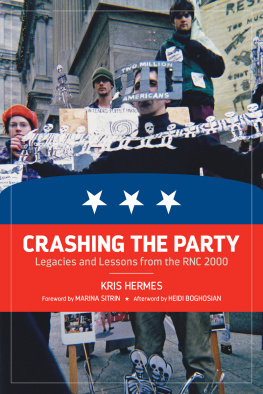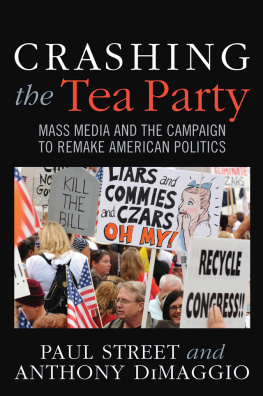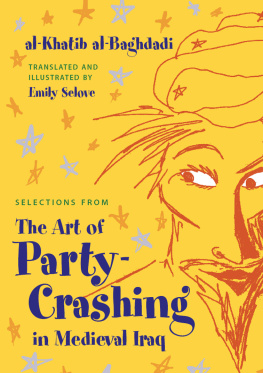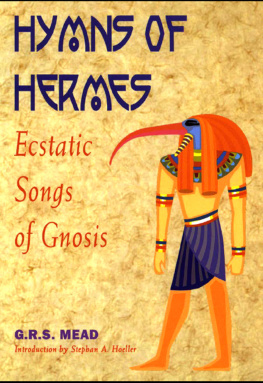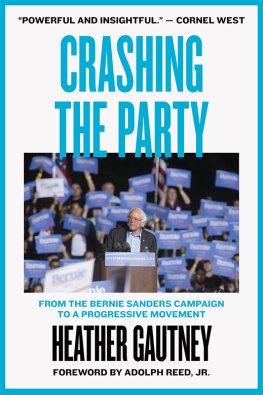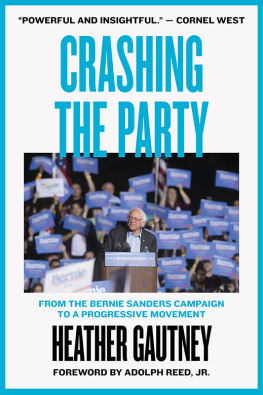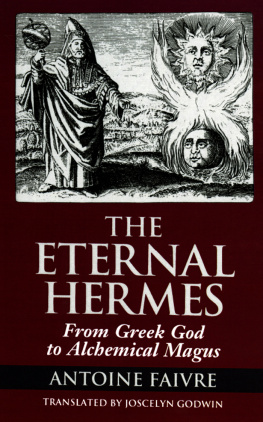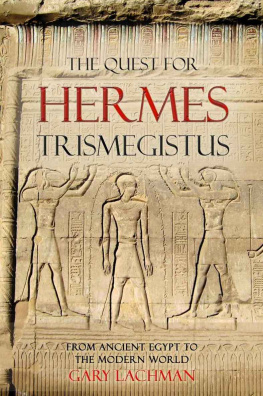Crashing the Party: Legacies and Lessons from the RNC 2000
Kris Hermes
ISBN: 978-1-62963-102-8
Library of Congress Control Number: 2015930883
Kris Hermes
This edition copyright 2015 PM Press
All Rights Reserved
Cover by John Yates/stealworks.com
Cover photo by R2K Legal Collective
Layout by Jonathan Rowland
PM Press
PO Box 23912
Oakland, CA 94623
www.pmpress.org
10 9 8 7 6 5 4 3 2 1
A portion of the proceeds from this book will be dedicated to a legal support project for the incubation of autonomous law collectives.
CrashingThePartyTheBook.com
Printed by the Employee Owners of Thomson-Shore in Dexter, Michigan.
www.thomsonshore.com
Contents
This book is dedicated to my mother and father, Jeanette and Al Hermes, whose constant encouragement gave me the confidence to attempt all things, to my partner, Erin Stalnaker, whose breadth of support was, and is, invaluable and to Zorra, who sat diligently at my feet for many long hours of writing.
A CKNOWLEDGMENTS
This book is a humble testament to the thousands of people who protested in Philadelphia in the summer of 2000, hundreds of whom were arrested and thereby caught up in the criminal injustice system along with their friends and families. This book is my attempt to chronicle and acknowledge the efforts of a committed group of folks who devoted a significant portion of their lives to build a unified and militant response to state repression of political activity.
In the course of defending themselves against their own criminal charges, several RNC arrestees became core members of the R2K Legal Collective, personifying the DIY ethic of legal strategy by and for those most directly affected. They included: Jacqueline Ambrosini, Caleb Arnold, Alexis Baden-Meyer, Bill Beckler, Christopher Day, Adam Eidinger, Jamie Graham, Jessica Mammarella, Dave Onion, Laura McTighe, Carlos Muos, Danielle Redden, George Ripley, Kate Sorensen, Ethan Zeke Spier, Camilo Viveiros, and Chris White.
Movement attorneys were an important part of the R2K Legal Collective and took direction from their dissident clients while ardently defending them against political charges. They included: Paul Hetznecker, Larry Krasner, Paul Messing, David Rudovsky, and Lester Roy Zipris, as well as public defenders Bradley Bridge, Meg Flores, and Shawn Nolan. Some attorneyssuch as King Downing from New Jersey, Anastasia Pardalis and Ron McGuire from New Yorkcame regularly to Philadelphia to help defend protesters. Marina Sitrin and Bill Beckler, recent law school graduates at the time, temporarily relocated from New York and, along with others, helped redefine the relationship between defendant and attorney. They also helped to politicize the criminal cases and make that a key element of the legal strategy.
At the heart of the R2K Legal Collective was a group of dedicated activists who did not themselves face charges but fiercely supported RNC arrestees. They included: Jill Benowitz, Kristin Bricker, Amy Dalton, Julie Davids, Jody Dodd, Bull Gervasi, Tim Groves, Christian xtn Hansen, Lee James, Katie Krauss, Amy Kwasnicki, Eric Laursen, Bronwyn Lepore, Elena and Elliott Madison, Sara Marcus, Nicole Meyenberg, Rachel Neumann, Clarissa Rogers, April Rosenblum, Matthew Ruben, Curtis Rumrill, Marlene Santoyo, Mac Scott, April Smith, David Webber, Susan Whitaker, and Lesley Wood.
Ezra Berkley Nepon led the charge to raise a near-miraculous $200,000 for bail and legal defense funds.
Suzy Subways was instrumental in creating a multimedia oral history archive of the Student Liberation Action Movement, a group intimately involved in the planning and execution of the August 1 day of direct action against the prison industrial complex. This book draws extensively from the SLAM Herstory Project.
Brad Kayal not only took a number of compelling photographs from the streets, but was also gracious enough to let us include them here.
Much appreciation goes to the National Lawyers Guild members and staff whose work and dedication have been an inspiration. Former Executive Director Heidi Boghosian and national office staff Traci Yoder and Tasha Moro deserve special praise for their steadfast support.
Finally, this book would not have been possible without the skilled and thoughtful editing of AK Thompson to whom I am very grateful.
F OREWORD
P HILADELPHIA, A UGUST 2000: T HE R EPUBLICAN N ATIONAL Convention (RNC) changed the U.S. political landscape. But not how one might imagine.
Hundreds of people were in jailroughly three to four hundred; the full count had not even come in yet. Those of us on the outside providing legal support were hearing stories of arrestees refusing to comply with the police, demanding that the physical abuse stop, that people not be separated or isolated, and that all arrestees receive the same treatment. There had been reports of people being hog-tied and beaten by police, resulting in broken fingers, concussions, serious contusions, and even sexual assaults. Stories came out of activists piling on top of one another in puppy piles to prevent the targeting of certain arrestees, people going limp and removing their clothes as a form of non-cooperation, and holding tight to one another so that the police violence would at least not be individual. While in jail, facing violent and abusive conditions, these activistsled by womencreated an atmosphere of support, care, and powerful solidarity: singing, holding assemblies, making demands, and protecting one another. The collective power of the arrestees was incredible and the solidarity, in light of such abuse, was something that sent shivers down our spines.
Of more than four hundred people arrested at the 2000 RNC in Philadelphia, most initially refused to give their names or allow themselves to be fingerprinted, acting in solidarity with their fellow arrestees to avoid selective abuse and excessive charging, especially against the more than three dozen people charged with felonies, ranging from riot and conspiracy to aggravated assault and attempted murder of a police officer. As the police violence against them increased, their solidity increased as well.
But then we got the call. District Attorney Lynne Abraham said that if we thought she would negotiate we shouldand I quote, as I was the one to speak with herget a life. Shit. Silence. Long pause. Now what? What do we tell our friends in jail who are staying so strong in the face of such abuse and who are trying to leverage negotiations on the outside? But there was going to be no negotiation. It was time to revisit our strategy.
The strategy of noncompliance, to achieve the same low-level charges for all people, had been successful in other cities at different times throughout history, including at recent anti-IMF protests in Washington, DC, and famously in Seattle at the anti-WTO protests in 1999. Months before the demonstrations in Philadelphia, the R2K Legal Collective was organized to set up a team of lawyers willing to work with arrested protestors and their allies.
As part of the legal team and one of those who temporarily moved to Philadelphia after the arrests, I can say without a doubt that it was both one of the most frightening and ultimately one of the most inspiring experiences I have ever had. The intention of the legal support effort was to change the political atmosphere so that when those charged with felonies and facing decades in jail went to trial they would do so in a very different political climateone where the public, and in particular the Philadelphia jury poolwould know that those arrested were targets of a coordinated campaign to criminalize and silence dissent. R2K Legal helped facilitate this process and victory.

